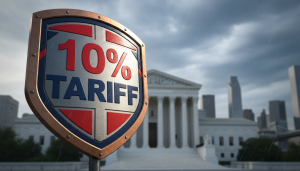Inflation Worries Experts: What It Means for the Economy
Explore how inflation worries experts and the potential impacts on the economy, from market trends to forecasted financial stability.

Inflation Worries Experts: What It Means for the Economy
Inflation Worries Experts: And What It Means for the Economy. Inflation is now a big worry for financial experts. They think the Federal Reserve should reconsider its interest rate policies. Lauren Saidel-Baker, an economist, said on Yahoo Finance, “These are broad-based inflationary pressures… I see more reason for rates to be rising, not to let inflation get away from us.”
Recent reports are raising concerns. The Michigan Consumer Sentiment Index for August fell to 58.6%. This is the first drop in four months. Also, people now expect prices to rise 4.9% next year, up from 4.5% last month, according to Investopedia.
Experts say we can’t ignore the effects of rising inflation. They warn that it could harm our finances and disrupt the market. So, everyone is watching what the Federal Reserve will do next. Their decisions will shape our economy.
Inflation Worries Experts: Key Takeaways
- Inflation concerns are prompting some experts to recommend delaying rate cuts.
- The Michigan Consumer Sentiment Index for August showed a notable decline.
- Consumer inflation expectations for the year ahead have increased.
- Continued inflation could affect financial stability and market trends.
- Upcoming Federal Reserve policy decisions are vital.
- Consumers and investors are increasingly focused on economic impacts.
- A strong GDP report could boost market confidence, according to Network World News.
Implications of Rising Inflation Rates
The latest hotter wholesale inflation print shows significant changes. The Producer Price Index (PPI) hit a three-year high. This is due to higher wages, energy costs, and tariffs.
Consumer prices are also rising. Dental care and airline fares are getting more expensive. This change could mean a shift in how prices move.
The Federal Reserve must balance job creation and price stability. The job market and inflation trends are tricky. The Fed’s decisions on interest rates will significantly impact employment and prices.
| Economic Indicator | Current Value | Previous Value |
|---|---|---|
| PPI | 3-Year High | N/A |
| CPI | Increased | Stable |
| GDP Growth (2023) | 2.5% | N/A |
| Unemployment Rate (April 2023) | 3.5% | 4.1% |
The hotter wholesale inflation and CPI changes show the economy’s complexity. Economic analysis suggests a tough road ahead. The Fed must carefully adjust interest rates to maintain stability and promote growth.
Market Reactions and Economic Forecast
Markets have stayed calm despite scary inflation numbers. The Producer Price Index (PPI) went up by 0.9% last month and 3.3% from a year ago. The core PPI also rose by 0.9% month-over-month and 3.7% year-over-year. This has prompted speculation about what the Federal Reserve might do next.
The Federal Reserve’s plans are being watched closely. The CME FedWatch Tool shows a 7.5% chance the Fed won’t change rates. The chance of a 50-basis-point cut dropped to 0%, with a 25-basis-point cut now seen as 92.5% likely. This information is crucial for understanding market sentiment and expectations.
Financial experts report that service prices rose 1.1% in July and goods prices 0.7%. This inflation is causing concern about future monetary policy and rate changes. So, everyone is waiting for Federal Reserve Chair Jerome Powell’s speeches for hints on what’s next.
Many economists are worried about inflation’s long-term effects. They suggest possible rate changes. For more on these market shifts, see how economic stimuli and consumer behavior are affected.
| Economic Indicator | Recent Change | Previous Value |
|---|---|---|
| Producer Price Index (PPI) | +0.9% | — |
| PPI from a Year Ago | +3.3% | — |
| Core PPI | +0.9% | — |
| Core PPI from a Year Ago | +3.7% | — |
| Services Prices | +1.1% in July | — |
| Goods Prices | +0.7% in July | — |
The market’s reaction to inflation shows a mix of hope and caution. The possibility of Federal Reserve policy changes is strong. Watching these trends closely will help us better understand the economy and prepare for the future.
Inflation Worries Experts: What It Means for the Economy
Experts are worried about inflation. They look at the consumer price index (CPI) data. This shows inflation rates have been between 1.7% and 2.6% in recent months.
Core inflation, such as CPI-trim and CPI-median, has remained around 3%. This indicates that inflation is a significant concern.
Energy prices fell 11% year over year in May. However, vehicle prices increased by 4.1% in June. These changes affect different parts of the economy.
Grocery prices have declined slightly. This helps keep inflation in the shelter category from getting too high. It’s because of lower mortgage interest costs.
About 55% of the CPI basket saw inflation over 3.0% in June. This wide inflation affects the economy’s stability. It calls for strong policy actions.
The GDP growth rate declined from 5.0% to 4.8% from 2020 to 2022. Experts say we need better investments and productivity to stabilize the economy.
The government’s plans, such as the February budget, are key to addressing these economic challenges. Experts say we need smart actions to keep the economy stable.
| Month | Headline CPI | Core Inflation |
|---|---|---|
| January | 1.9% | N/A |
| February | 2.6% | 3.0% |
| April | 1.7% | 3.1% |
| May | 1.7% | 3.0% |
| June | 1.9% | 3.0% |
The CPI data indicate that we need to make informed decisions. Knowing how inflation affects us is key for everyone. The debate shows we must act now to face these challenges.
For more information on these economic issues, see here.
Inflation Worries Experts: What It Means for the Economy Conclusion
Inflation rates are rising, causing worry for many. Experts frequently discuss its impact on the economy. The annual inflation rate fell from 6.2 percent to 5.2 percent over the year. The Federal Reserve has raised interest rates to combat this issue.
Some sectors, such as leisure and hospitality, are struggling. But, as the pandemic fades, people might spend more on services. This shift could help balance things out. Goods spending has increased, leading to supply chain issues and higher prices.
Everyone needs to stay up to date on economic news and developments. Staying on top of financial analysis and adapting to market changes is key. The future is challenging, but it also presents opportunities for smart financial decisions.
Inflation Worries Experts: FAQ
What are the primary drivers behind the recent surge in wholesale inflation?
The Producer Price Index (PPI) for July hit a three-year high. This is primarily due to rising service inflation. Higher wages, rising energy costs, and tariffs are key factors.








